人教版八年级下册Unit1 What's the matter?Section A grammar课件 (共18张PPT)
文档属性
| 名称 | 人教版八年级下册Unit1 What's the matter?Section A grammar课件 (共18张PPT) | 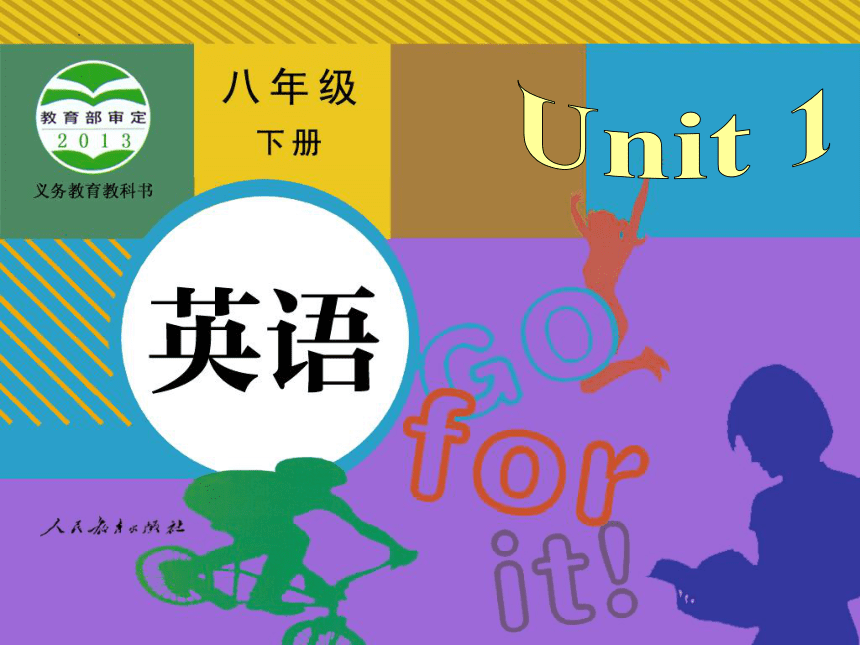 | |
| 格式 | zip | ||
| 文件大小 | 1.1MB | ||
| 资源类型 | 教案 | ||
| 版本资源 | 人教新目标(Go for it)版 | ||
| 科目 | 英语 | ||
| 更新时间 | 2022-07-30 15:00:50 | ||
图片预览

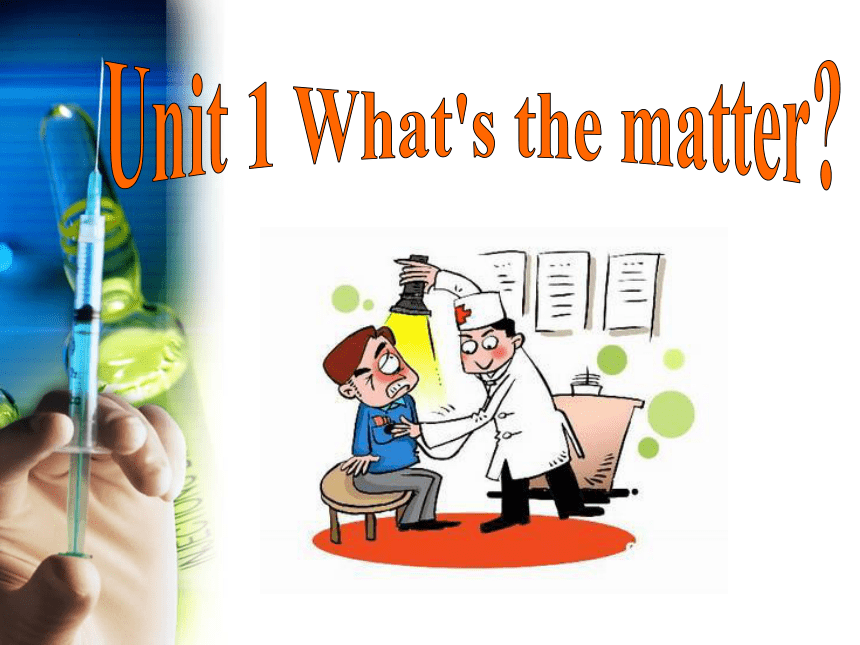
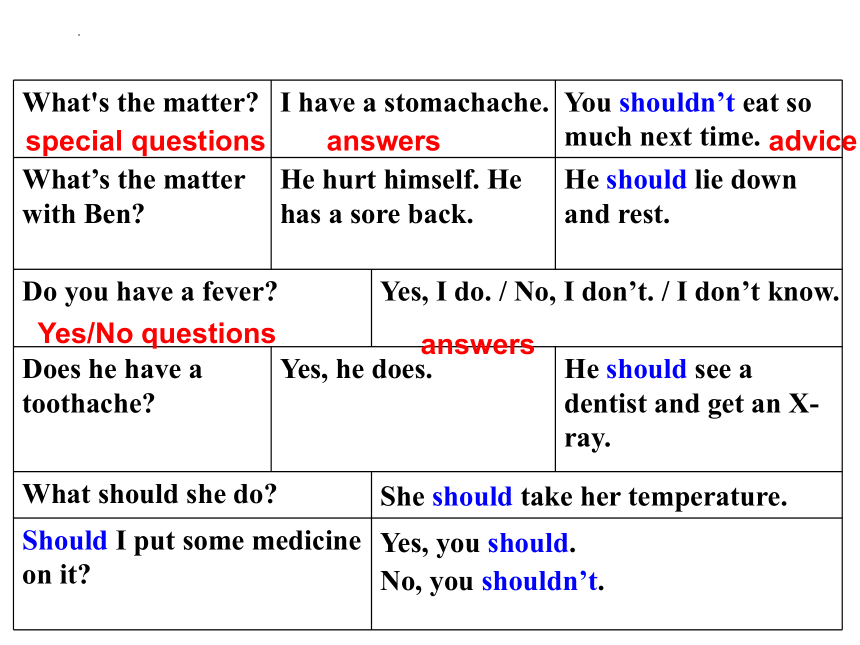
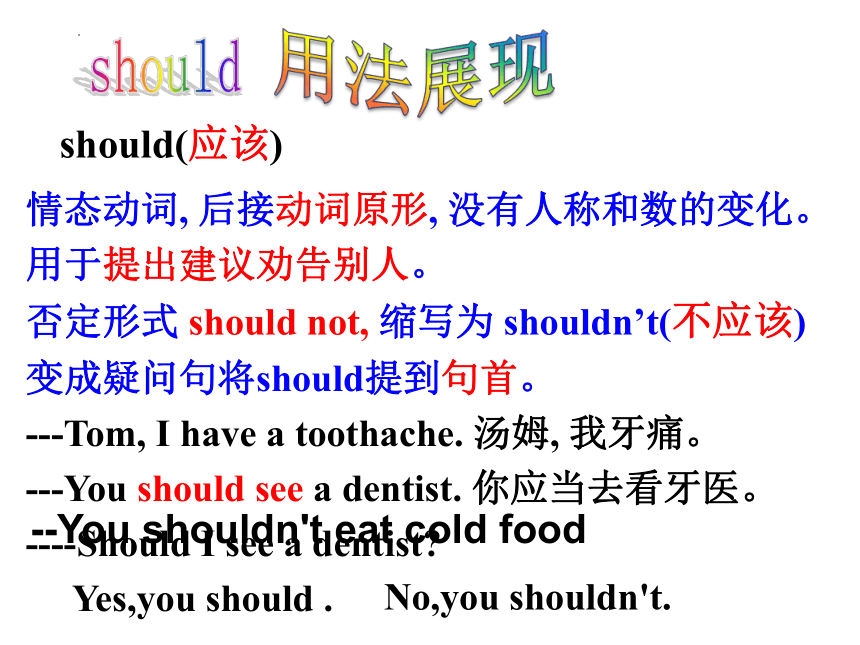
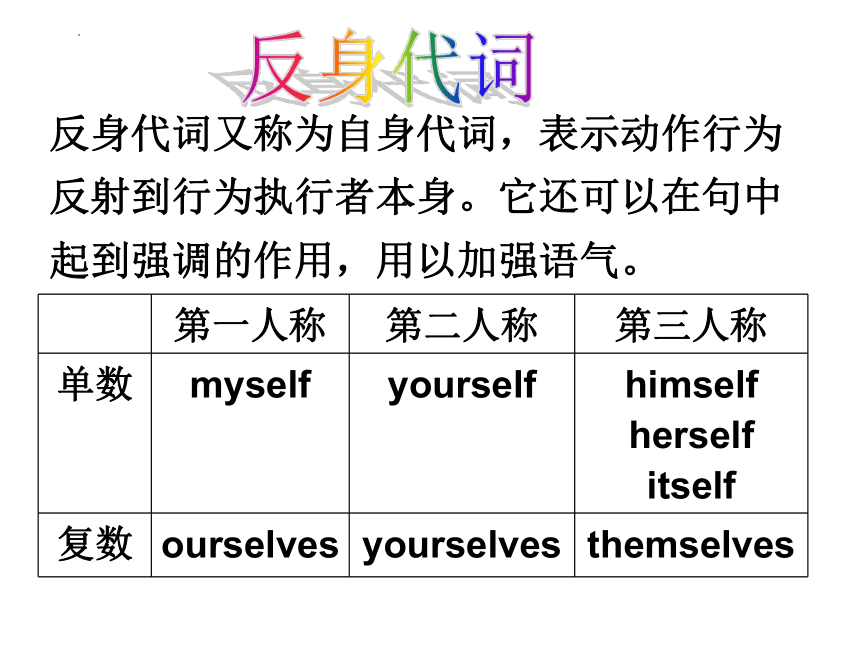
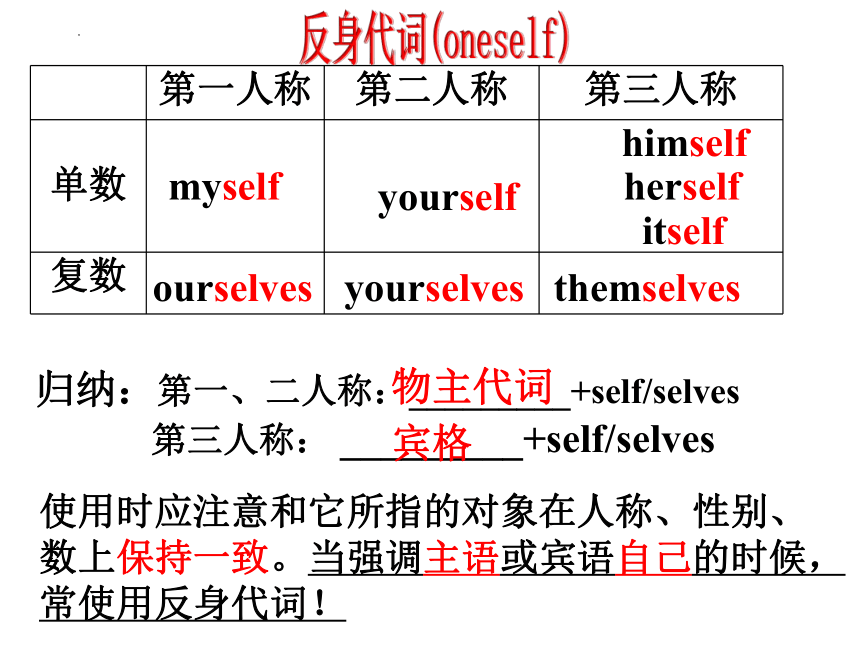
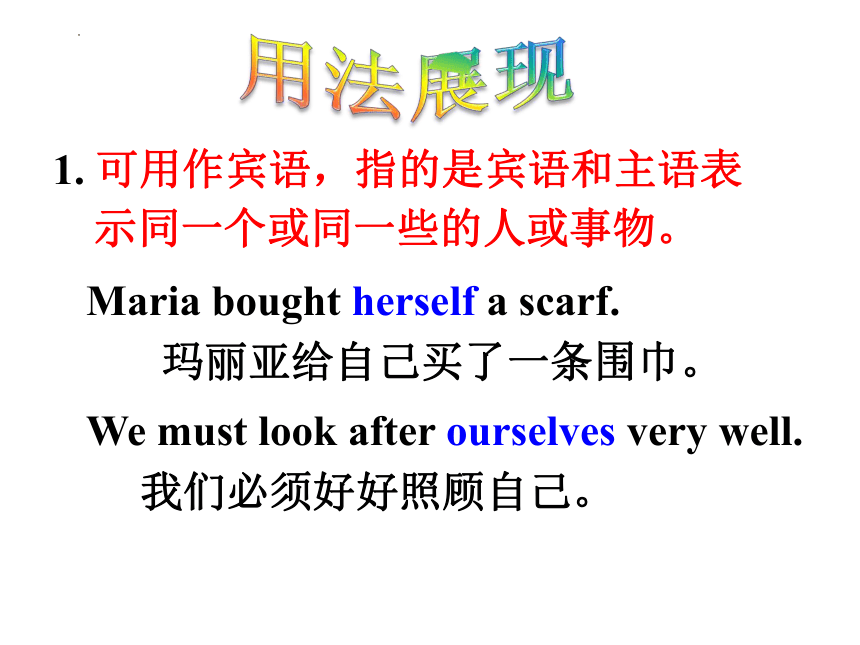
文档简介
(共18张PPT)
Unit 1
Unit 1 What's the matter
What's the matter I have a stomachache. You shouldn’t eat so much next time.
What’s the matter with Ben He hurt himself. He has a sore back. He should lie down and rest.
Do you have a fever Yes, I do. / No, I don’t. / I don’t know.
Does he have a toothache Yes, he does. He should see a dentist and get an X-ray.
What should she do She should take her temperature.
Should I put some medicine on it Yes, you should. No, you shouldn’t.
special questions
answers
advice
Yes/No questions
answers
情态动词, 后接动词原形, 没有人称和数的变化。用于提出建议劝告别人。
否定形式 should not, 缩写为 shouldn’t(不应该)
变成疑问句将should提到句首。
---Tom, I have a toothache. 汤姆, 我牙痛。
---You should see a dentist. 你应当去看牙医。
----Should I see a dentist
Yes,you should .
should(应该)
用法展现
should
No,you shouldn't.
--You shouldn't eat cold food
反身代词又称为自身代词,表示动作行为反射到行为执行者本身。它还可以在句中起到强调的作用,用以加强语气。
第一人称 第二人称 第三人称
单数 myself yourself himself
herself
itself
复数 ourselves yourselves themselves
反身代词
第一人称 第二人称 第三人称
单数
复数
myself
yourself
himself
herself
itself
ourselves
yourselves
themselves
反身代词(oneself)
归纳:第一、二人称:_________+self/selves
第三人称: _________+self/selves
物主代词
宾格
使用时应注意和它所指的对象在人称、性别、数上保持一致。当强调主语或宾语自己的时候,常使用反身代词!
1. 可用作宾语,指的是宾语和主语表示同一个或同一些的人或事物。
Maria bought herself a scarf.
玛丽亚给自己买了一条围巾。
We must look after ourselves very well.
我们必须好好照顾自己。
2. 反身代词不能单独做主语,但可以做
主语的同位语,起强调作用。
如:我自己能完成作业。
(误) Myself can finish my homework.
(正) I myself can finish my homework. /
I can finish my homework myself.
2. 反身代词表示“某人自己”,
表示“某人自己的(东西)”,要用one’s own.
我自己的笔: my own pens
1. Li Ming made a card for _______ just now.
2. Bad luck! I cut _______ yesterday.
3. They tell us they can look after __________
very well.
4. My cat can find food by _____.
himself
myself
themselves
itself
4a Fill in the blanks and practice the conversations.
1. A: I hurt ______ when I played basketball yesterday. What _______ I do
B: You ______ see a doctor and get an X-ray.
myself
should
should
2. A: _______ the matter
B: My sister and I ______ sore throats.
_______ we go to school
A: No, you _________.
What’s
have
Should
shouldn’t
3. A: _____ Mike _____ a fever
B: No, he ________. He _____ a stomachache.
A: He _______ drink some hot tea.
Does
have
doesn’t
has
should
1. Jenny cut herself.
She should (get an X-ray /
put some medicine on the cut).
My advice: _______________________.
4b Circle the best advice for these health problems. Then add your own advice.
She should put a bandage on it.
2. Kate has a toothache.
She should (see a dentist /get some sleep).
My advice: ________________________.
3. Mary and Sue have colds.
They shouldn’t (sleep/ exercise).
My advice: ______________________.
She shouldn’t eat cold food
She should drink more water
4. Bob has a sore back.
He should
(lie down and rest /
take his temperature).
My advice: ______________.
He should get an X-ray.
A: What’s the matter Did you hurt yourself playing soccer.
B: No, I didn’t.
C: Did you fall down
B: Yes, I did.
D: You should go home and get some rest.
2 Put these questions and answers in order to make a conversation.
___ I hurt myself playing soccer.
I have a sore leg.
___ What should I do
___ I think you should see a doctor
and get an X-ray.
___ OK, thanks. I’ll do that now.
___ What’s the matter
___ Oh, that doesn’t sound good.
2
3
5
6
1
4
3. Write advice for these people.
1) Problem: Alan cut himself.
Advice:______________________
2) Problem: Cindy has a headache.
Advice:__________________________
3) Problem: My cousins have bad colds.
Advice:________________________________
4) Problem: Jack hurt his back playing volleyball.
Advice:________________________________
He should put some medicine on it.
She should take a temperature and rest.
They should lie down, rest and drink more water.
He should go to the hospital and get an X-ray.
Unit 1
Unit 1 What's the matter
What's the matter I have a stomachache. You shouldn’t eat so much next time.
What’s the matter with Ben He hurt himself. He has a sore back. He should lie down and rest.
Do you have a fever Yes, I do. / No, I don’t. / I don’t know.
Does he have a toothache Yes, he does. He should see a dentist and get an X-ray.
What should she do She should take her temperature.
Should I put some medicine on it Yes, you should. No, you shouldn’t.
special questions
answers
advice
Yes/No questions
answers
情态动词, 后接动词原形, 没有人称和数的变化。用于提出建议劝告别人。
否定形式 should not, 缩写为 shouldn’t(不应该)
变成疑问句将should提到句首。
---Tom, I have a toothache. 汤姆, 我牙痛。
---You should see a dentist. 你应当去看牙医。
----Should I see a dentist
Yes,you should .
should(应该)
用法展现
should
No,you shouldn't.
--You shouldn't eat cold food
反身代词又称为自身代词,表示动作行为反射到行为执行者本身。它还可以在句中起到强调的作用,用以加强语气。
第一人称 第二人称 第三人称
单数 myself yourself himself
herself
itself
复数 ourselves yourselves themselves
反身代词
第一人称 第二人称 第三人称
单数
复数
myself
yourself
himself
herself
itself
ourselves
yourselves
themselves
反身代词(oneself)
归纳:第一、二人称:_________+self/selves
第三人称: _________+self/selves
物主代词
宾格
使用时应注意和它所指的对象在人称、性别、数上保持一致。当强调主语或宾语自己的时候,常使用反身代词!
1. 可用作宾语,指的是宾语和主语表示同一个或同一些的人或事物。
Maria bought herself a scarf.
玛丽亚给自己买了一条围巾。
We must look after ourselves very well.
我们必须好好照顾自己。
2. 反身代词不能单独做主语,但可以做
主语的同位语,起强调作用。
如:我自己能完成作业。
(误) Myself can finish my homework.
(正) I myself can finish my homework. /
I can finish my homework myself.
2. 反身代词表示“某人自己”,
表示“某人自己的(东西)”,要用one’s own.
我自己的笔: my own pens
1. Li Ming made a card for _______ just now.
2. Bad luck! I cut _______ yesterday.
3. They tell us they can look after __________
very well.
4. My cat can find food by _____.
himself
myself
themselves
itself
4a Fill in the blanks and practice the conversations.
1. A: I hurt ______ when I played basketball yesterday. What _______ I do
B: You ______ see a doctor and get an X-ray.
myself
should
should
2. A: _______ the matter
B: My sister and I ______ sore throats.
_______ we go to school
A: No, you _________.
What’s
have
Should
shouldn’t
3. A: _____ Mike _____ a fever
B: No, he ________. He _____ a stomachache.
A: He _______ drink some hot tea.
Does
have
doesn’t
has
should
1. Jenny cut herself.
She should (get an X-ray /
put some medicine on the cut).
My advice: _______________________.
4b Circle the best advice for these health problems. Then add your own advice.
She should put a bandage on it.
2. Kate has a toothache.
She should (see a dentist /get some sleep).
My advice: ________________________.
3. Mary and Sue have colds.
They shouldn’t (sleep/ exercise).
My advice: ______________________.
She shouldn’t eat cold food
She should drink more water
4. Bob has a sore back.
He should
(lie down and rest /
take his temperature).
My advice: ______________.
He should get an X-ray.
A: What’s the matter Did you hurt yourself playing soccer.
B: No, I didn’t.
C: Did you fall down
B: Yes, I did.
D: You should go home and get some rest.
2 Put these questions and answers in order to make a conversation.
___ I hurt myself playing soccer.
I have a sore leg.
___ What should I do
___ I think you should see a doctor
and get an X-ray.
___ OK, thanks. I’ll do that now.
___ What’s the matter
___ Oh, that doesn’t sound good.
2
3
5
6
1
4
3. Write advice for these people.
1) Problem: Alan cut himself.
Advice:______________________
2) Problem: Cindy has a headache.
Advice:__________________________
3) Problem: My cousins have bad colds.
Advice:________________________________
4) Problem: Jack hurt his back playing volleyball.
Advice:________________________________
He should put some medicine on it.
She should take a temperature and rest.
They should lie down, rest and drink more water.
He should go to the hospital and get an X-ray.
同课章节目录
- Unit 1 What's the matter?
- Section A
- Section B
- Unit 2 I'll help to clean up the city parks.
- Section A
- Section B
- Unit 3 Could you please clean your room?
- Section A
- Section B
- Unit 4 Why don't you talk to your parents?
- Section A
- Section B
- Unit 5 What were you doing when the rainstorm came
- Section A
- Section B
- Review of Units 1-5
- Unit 6 An old man tried to move the mountains.
- Section A
- Section B
- Unit 7 What's the highest mountain in the world?
- Section A
- Section B
- Unit 8 Have you read Treasure Island yet?
- Section A
- Section B
- Unit 9 Have you ever been to a museum?
- Section A
- Section B
- Unit 10 I've had this bike for three years.
- Section A
- Section B
